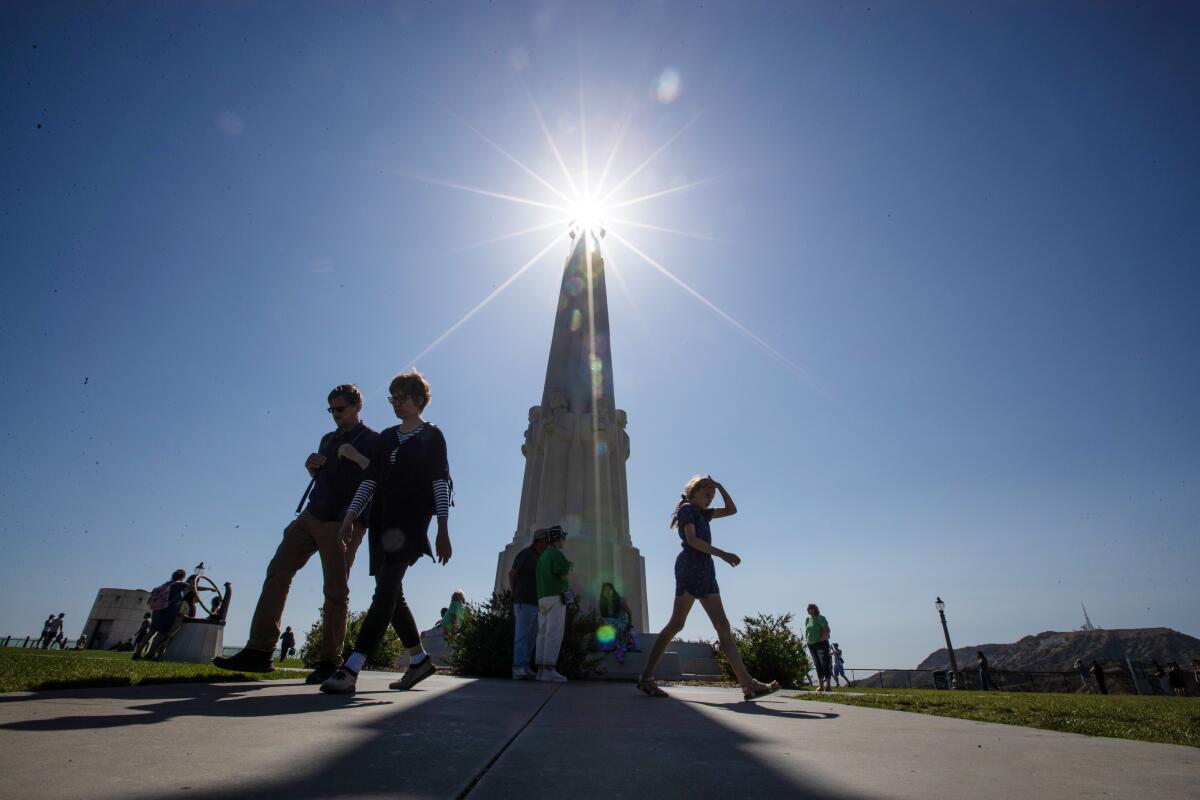First heat wave of the summer bears down on SoCal. Antelope and Santa Clarita valleys hit triple digits

- Share via
Southern Californians should brace for another few days of high temperatures, as the first heat wave of the summer continues to bear down on the region, increasing the risk of wildfires and heat-related illness.
High pressure brought hot conditions to the mountains, deserts and interior valleys Monday, with cloudy skies at the beaches and warm temperatures over the coastal valleys. Tuesday and Wednesday were expected to be slightly cooler but still toasty. Significant cooling is expected Thursday, with triple-digit temperatures expected again next week.
The hottest temperatures were seen in the Antelope Valley, which reached 105 degrees Monday. Saugus reached 101 degrees in the Santa Clarita Valley, and Woodland Hills saw a high of 97 degrees, according to the National Weather Service.
“This is fairly normal — July and August are our hottest months in Southern California for interior areas,” NWS forecaster David Gomberg said. “It’s certain we’ve seen worse heat waves that lasted a longer duration, so I would call this a more routine heat wave.”
The weather service issued a heat warning until Monday at 8 p.m. for the Santa Clarita Valley, the Antelope Valley and its western and eastern foothills. A heat advisory was also issued for Cuyama Valley, the San Luis Obispo County mountains, Santa Barbara County’s interior mountains, northern Ventura County’s mountains, the Interstate 5 corridor, the western San Gabriel Mountains and the 14 Freeway corridor.
High temperatures were expected to moderate Tuesday to around 80 degrees in downtown Los Angeles and the upper 80s and mid-90s in the valleys. Santa Clarita and Woodland Hills were still expected to be hottest at 93 to 95 degrees. Deserts were expected to cool down to below 100.
By Thursday, temperatures are expected to drop into the 80s in the valleys and 70s along the coast. It could warm up again early next week around Monday and Tuesday, with temperatures pushing back up into the triple digits for most of the valleys.
On Sunday, Los Angeles County’s health officer urged the public to prepare against heat-related illness, especially outdoor workers, older adults, young children, athletes and people with chronic medical conditions susceptible to effects from extreme heat.
The county health agency advised people to stay hydrated by drinking water, avoid going outside during the hottest hours, wear lightweight clothing with a hat or an umbrella and use sunscreen. Children and pets should never be left inside cars, even if the windows are open.
Signs of heatstroke include a body temperature of 103 degrees or higher, dry, red or damp skin, a fast heart pulse, nausea, dizziness, confusion and passing out, according to the U.S. Centers for Disease Control and Prevention. Seek medical attention immediately if you’re experiencing these symptoms, move to a cooler place and apply cool cloths to your skin.
The National Oceanic and Atmospheric Administration has predicted a warmer than normal summer. The temperature map shows that in California, especially northern parts of the state, there will be a 33% to 50% probability that temperatures will be above average.
Through Thursday, wildfire risk is heightened for interior valleys, lower mountains and deserts, where vegetation is starting to dry out, Gomberg said. Santa Clarita and the Antelope Valley are “really dry and susceptible to more fire threat issues,” he said. Higher elevations aren’t as dry as past seasons because of all of the rain and snow Southern California received this winter.
Residents can prepare for wildfires by staying up-to-date on evacuation procedures, installing multipaned windows and weather stripping around doorways to keep ash and smoke out of the house and having an action plan.
More to Read
Sign up for Essential California
The most important California stories and recommendations in your inbox every morning.
You may occasionally receive promotional content from the Los Angeles Times.














